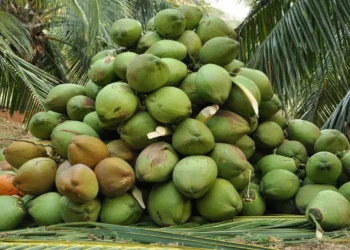In a bold move to curb illegal fishing activities within Ghana’s Exclusive Economic Zone (EEZ), the Ministry of Fisheries and Aquaculture, in collaboration with the Fisheries Commission, has suspended the licences of four industrial trawl vessels for repeated violations of the Fisheries Act, 2002 (Act 625) and the Fisheries Regulations, 2010 (L.I. 1968).
The affected vessels—Meng Xin 10, owned by Nassa Co. Ltd.; Florence 2, owned by Akrafi Fisheries; and Long Xiang 607 and Long Xiang 608, both owned by Wannimas Complex Co. Ltd.—were found to have engaged in a series of illegal fishing practices.
According to the Ministry, these included unauthorised transshipment, the dumping of fish, fishing in restricted zones, and the harvesting of juvenile fish, all of which significantly threaten Ghana’s marine ecosystem and jeopardize the livelihoods of thousands of artisanal fishers along the country’s coastline.
“In accordance with Sections 76(1) and 76(2) of the Fisheries Act, 2002 (Act 625), which empower the Minister to suspend licenses of vessels involved in repeated illegalities, the affected vessels have had their licences suspended for a period of twelve (12) months, effective 1st April 2025.”
Ministry of Fisheries and Aquaculture
Ghana’s fisheries sector has long faced mounting challenges from overfishing and Illegal, Unreported, and Unregulated (IUU) fishing activities.
The Ministry of Fisheries, in its statement, indicated that these illicit operations continue to endanger marine biodiversity, weaken the economic standing of artisanal fishers, and compromise national food security.
According to the Ministry, among these illegal practices, transshipment—locally referred to as ‘Saiko’—has been particularly destructive, contributing to the depletion of key fish stocks and undermining efforts to ensure sustainable marine governance.

The statement emphasized that the Fisheries Act, 2002 (Act 625) explicitly criminalizes illegal transshipment under Section 132, while Regulation 33(2) of L.I. 1968 strictly prohibits transshipment between industrial trawlers and artisanal canoes.
However, according to the Ministry, despite existing legal frameworks, some industrial fishing operators have continued to exploit loopholes and engage in unsanctioned fishing methods, worsening the crisis in Ghana’s marine sector.
Illegal transshipment allows industrial vessels to offload their catch at sea to smaller boats, bypassing landing sites where regulatory authorities monitor fish stock levels.
This practice, the statement noted, not only depletes fish populations at an unsustainable rate but also denies local fishers their fair share of marine resources.
According to the Ministry, this practice further disrupts the livelihoods of coastal communities that rely on legal and regulated fishing practices to sustain their economies.
International Commitments and Sustainable Development
Beyond domestic concerns, the Ministry of Fisheries and Aquaculture noted that Ghana’s obligations to international fisheries governance frameworks are at stake.
These illegal activities contravene global commitments, including the Sustainable Development Goals (SDG), particularly Goal 14, which focuses on conserving and sustainably using ocean resources.

Per the statement, persistent IUU fishing threatens Ghana’s standing within regional and global fisheries management structures and could lead to trade restrictions if the government fails to address these issues decisively.
“Despite ongoing stakeholder engagement, education and regulatory reforms, certain industrial fishing operators continue to act with impunity.
“The Ministry reiterates its unwavering commitment to the strict enforcement of fisheries laws and regulations as part of its mandate to safeguard Ghana’s marine resources”.
Ministry of Fisheries and Aquaculture
This latest move by the Ministry sends a strong signal to all industry stakeholders—whether industrial, semi-industrial, or artisanal—that non-compliance with the law will attract severe penalties.
The Ministry warned that continued violations will result in further sanctions, including permanent licence revocations and potential legal action against offending parties.

Additionally, this enforcement action underscores Ghana’s renewed commitment to ensuring that marine resources are managed responsibly for the benefit of both present and future generations.
The Ministry noted that it will also continue to engage stakeholders in the fisheries sector, including local fisherfolk, regulators, and international bodies, to enhance sustainable fishing practices and curb illegal activities.
It stressed that the government remains committed to working closely with enforcement agencies and industry players to ensure the sustainability of the fisheries sector while protecting livelihoods dependent on marine resources.
The Ministry reiterated its call for all fishing operators—industrial, semi-industrial, and artisanal—to comply fully with the law.
Fisherfolk and stakeholders were also urged to operate within the regulatory framework to support the country’s sustainable fisheries agenda.
For further clarification on this matter, the statement noted that the Acting Executive Director of the Fisheries Commission, Professor Benjamin Campion, is available for inquiries via phone at 024-777-6666 or email at benjamin.campion@fishcom.gov.gh
As Ghana battles the challenges posed by overfishing and illegal maritime practices, decisive actions like these provide a glimmer of hope for a future where marine resources are managed effectively for economic growth, environmental sustainability, and food security.
READ ALSO: Ghana Cedi’s True Value Is GH¢18 Despite Q1 Ranking- Analyst





















